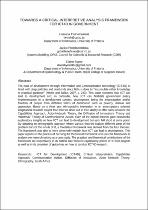JavaScript is disabled for your browser. Some features of this site may not work without it.
- ResearchSpace
- →
- Research Publications/Outputs
- →
- Conference Publications
- →
- View Item
| dc.contributor.author |
Twinomurinzi, H

|
|
| dc.contributor.author |
Phahlamohlaka, Letlibe J

|
|
| dc.contributor.author |
Byrne, E

|
|
| dc.date.accessioned | 2010-01-18T07:30:58Z | |
| dc.date.available | 2010-01-18T07:30:58Z | |
| dc.date.issued | 2009-05 | |
| dc.identifier.citation | Twinomurinzi, H, Phahlamohlaka, J and Byrne, E. 2009. Towards a critical-interpretive analysis framework for ICT4D in government. 10th International Conference on Social Implications of Computers in Developing Countries: Assessing the Contribution of ICT to Development Goals, Dubai, United Arab Emirates, 26-28 May 2009, pp 495-510 | en |
| dc.identifier.isbn | 9780903808057 | |
| dc.identifier.uri | http://hdl.handle.net/10204/3897 | |
| dc.description | 10th International Conference on Social Implications of Computers in Developing Countries: Assessing the Contribution of ICT to Development Goals, Dubai, United Arab Emirates, 26-28 May 2009 | en |
| dc.description.abstract | The road of development through Information and Communication technology (ICT4D) is lined with deep potholes and dead ends since little is done to “accumulate either knowledge or practical guidance” (Heeks and Bailur, 2007, p. 243). This paper concerns how ICT can lead to development and, in particular, how ICT can facilitate government policy implementation in a development context; development being the emancipation and/or freedom of people from different forms of domination such as poverty, disease and oppression. Based on a three year ethnographic immersion in an emancipatory oriented longitudinal research project four theories stood out in their ability to offer some answers; the Capabilities Approach, Actor-Network Theory, the Diffusion of Innovations Theory and Habermas’ Theory of Communicative Action. Each of the named theories gave resourceful explanatory insights on how ICT can lead to development but each fell short at some point. By adopting an ethnographic approach where various theories explain different parts of the problem but not the whole of it, a theoretical framework was derived from the four theories. The framework was able to more cohesively explain how ICT can lead to development. This paper reports on the process of deriving the theoretical framework and uses the framework to analyse one research setting as a case study. The practical and theoretical contributions of the framework are respectively in its critical interpretivist explanatory power of ICT4D projects as well as in its provision of guidelines on how to conduct ICT4D research. | en |
| dc.language.iso | en | en |
| dc.subject | Ethnography | en |
| dc.subject | Actor network theory | en |
| dc.subject | Communication action | en |
| dc.subject | ICT4D | en |
| dc.subject | Critical interpretivism | en |
| dc.title | Towards a critical-interpretive analysis framework for ICT4D in government | en |
| dc.type | Conference Presentation | en |
| dc.identifier.apacitation | Twinomurinzi, H., Phahlamohlaka, L. J., & Byrne, E. (2009). Towards a critical-interpretive analysis framework for ICT4D in government. http://hdl.handle.net/10204/3897 | en_ZA |
| dc.identifier.chicagocitation | Twinomurinzi, H, Letlibe J Phahlamohlaka, and E Byrne. "Towards a critical-interpretive analysis framework for ICT4D in government." (2009): http://hdl.handle.net/10204/3897 | en_ZA |
| dc.identifier.vancouvercitation | Twinomurinzi H, Phahlamohlaka LJ, Byrne E, Towards a critical-interpretive analysis framework for ICT4D in government; 2009. http://hdl.handle.net/10204/3897 . | en_ZA |
| dc.identifier.ris | TY - Conference Presentation AU - Twinomurinzi, H AU - Phahlamohlaka, Letlibe J AU - Byrne, E AB - The road of development through Information and Communication technology (ICT4D) is lined with deep potholes and dead ends since little is done to “accumulate either knowledge or practical guidance” (Heeks and Bailur, 2007, p. 243). This paper concerns how ICT can lead to development and, in particular, how ICT can facilitate government policy implementation in a development context; development being the emancipation and/or freedom of people from different forms of domination such as poverty, disease and oppression. Based on a three year ethnographic immersion in an emancipatory oriented longitudinal research project four theories stood out in their ability to offer some answers; the Capabilities Approach, Actor-Network Theory, the Diffusion of Innovations Theory and Habermas’ Theory of Communicative Action. Each of the named theories gave resourceful explanatory insights on how ICT can lead to development but each fell short at some point. By adopting an ethnographic approach where various theories explain different parts of the problem but not the whole of it, a theoretical framework was derived from the four theories. The framework was able to more cohesively explain how ICT can lead to development. This paper reports on the process of deriving the theoretical framework and uses the framework to analyse one research setting as a case study. The practical and theoretical contributions of the framework are respectively in its critical interpretivist explanatory power of ICT4D projects as well as in its provision of guidelines on how to conduct ICT4D research. DA - 2009-05 DB - ResearchSpace DP - CSIR KW - Ethnography KW - Actor network theory KW - Communication action KW - ICT4D KW - Critical interpretivism LK - https://researchspace.csir.co.za PY - 2009 SM - 9780903808057 T1 - Towards a critical-interpretive analysis framework for ICT4D in government TI - Towards a critical-interpretive analysis framework for ICT4D in government UR - http://hdl.handle.net/10204/3897 ER - | en_ZA |






